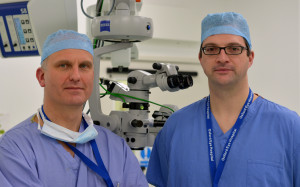The first clinical trial of a gene therapy for an inherited cause of progressive blindness has shown very promising results, surpassing expectations of the Oxford researchers leading the study.
Nine patients with the condition choroideremia have had one eye treated with the gene therapy in operations at Oxford Eye Hospital, part of Oxford University Hospitals NHS Trust.
The condition is caused by a defective gene that affects light sensing cells in the eye. The gene therapy works by replacing the gene, using a safe virus injected under the retina.
The research has received support from the National Institute for Health Research (NIHR) Oxford Biomedical Research Centre.
The aim of the initial study, led by the University of Oxford and Oxford University Hospitals, was to deliver gene therapy into cells in the retina without causing damage.
However, results showed improvements in patients’ vision in dim light and two patients were able to read more lines on the eye chart. The therapy is given in one eye to allow comparison with progression of the disease in the other eye.
Results at six months for the first six patients are reported in The Lancet medical journal today.
The first patient to be treated, 65-year-old Jonathan Wyatt, said: ‘My left eye, which had always been the weaker one, was that which was treated as part of this trial. Now when I watch a football match on the TV, if I look at the screen with my left eye alone, it is as if someone has switched on the floodlights. The green of the pitch is brighter, and the numbers on the shirts are much clearer.’
Based on the success of the treatment in the first six patients, three more have recently been tested at a higher dose.
Professor Robert MacLaren of the Nuffield Laboratory of Ophthalmology at the University of Oxford, and a consultant surgeon at the Oxford Eye Hospital, led the development of the retinal gene therapy and the first clinical trial.

(c) Mr John Brett, Oxford Eye Hospital
He said: ‘It is still too early to know if the gene therapy treatment will last indefinitely, but we can say that vision improvements have been maintained for as long as we have been following up the patients, which is two years in one case.
‘We are now trying higher doses of the gene therapy in the next part of the clinical trial to find what level is needed to stop the degeneration.
‘I am incredibly excited to see what will happen. The difficult bits are done: we know the virus carrying the gene therapy gets into the cells and the retina recovers after the surgery. Now it’s just waiting to see how the patients progress.’
The Phase I clinical trial is funded by the Health Innovation Challenge Fund, a partnership between the Wellcome Trust and the Department of Health with further support from the charity Fight for Sight.
Choroideremia is a rare inherited cause of blindness that affects around 1 in 50,000 people. The first signs tend to be seen in boys in late childhood, with the disease slowly progressing until vision is lost. There is currently no cure. It is caused by defects in the CHM gene on the X chromosome, which explains why it is almost always boys that are affected. Without the protein produced by the CHM gene, pigment cells in the retina of the eye slowly stop working, then die off. As the disease progresses, the surviving retina gradually shrinks in size, reducing vision.
The approach developed by the team uses a small, safe virus to carry the missing CHM gene into the light-sensing cells in the retina. In an operation similar to cataract surgery, the patient’s retina is first detached and then the virus is injected underneath using a very fine needle.
The aim is for the CHM gene, once delivered into the cells of the retina, to start producing protein and stop the cells dying off.
‘If we were able to treat people early, get them in their teens or late childhood, we’d be getting the virus in before their vision is lost,’ said Professor MacLaren. ‘If the treatment works, we would be able to prevent them from going blind.’
He added: ‘The results showing improvement in vision in the first six patients confirm that the virus can deliver its DNA payload without causing significant damage to the retina. This has huge implications for anyone with a genetic retinal disease such as age-related macular degeneration or retinitis pigmentosa, because it has for the first time shown that gene therapy can be applied safely before the onset of vision loss.’
Wayne Thompson, 43, an IT project manager in Staffordshire, was treated in April with a higher gene therapy dose as part of the subsequent trial. He said: ‘One night in the summer, my wife called me outside as it was a particularly starry evening. As I looked up, I was amazed that I was able to see a few stars. I hadn’t seen stars for a long, long time…For a long time I lived with the certainty of losing vision. Now I have uncertainty of whether the trial will work, but it is worth the risk.’
Professor Miguel Seabra, whose research at Imperial College London identified the protein involved in choroideremia, said: ‘My team has spent 20 years trying to understand choroideraemia and develop a cure, so to finally see the rewards reaching patients is extremely gratifying, both for us and the families who supported our research.’